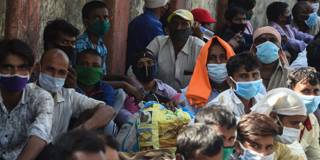By sharply curtailing international trade, the COVID-19 pandemic has accelerated a trend that was already underway. It is now more important than ever for developing countries to seek alternatives to export-led growth.
NEW HAVEN – The COVID-19 pandemic seems to have curtailed globalization in ways that the current US administration could scarcely have dreamed up even a year ago. But, viewed in a broader context, this year’s retreat from globalization is merely the latest chapter in an ongoing process that has left the developing world increasingly pessimistic about pursuing export-driven growth as a path out of poverty.
Before COVID-19 arrived, the latest World Bank estimates showed that the share of the world’s population living in extreme poverty (less than $1.90 per day in 2011 dollars) had declined from 36% in 1990 to 10% in 2015. But the pandemic has since threatened to reverse some of this progress; and even without the current crisis, poverty would have remained an important challenge in many parts of the world, not least Sub-Saharan Africa.
Advanced economies – particularly the United States and the United Kingdom – have increasingly been turning inward, restricting trade, undermining multilateralism, and closing their borders to immigrants. And it is exceedingly unlikely that these trends will be reversed any time soon.

NEW HAVEN – The COVID-19 pandemic seems to have curtailed globalization in ways that the current US administration could scarcely have dreamed up even a year ago. But, viewed in a broader context, this year’s retreat from globalization is merely the latest chapter in an ongoing process that has left the developing world increasingly pessimistic about pursuing export-driven growth as a path out of poverty.
Before COVID-19 arrived, the latest World Bank estimates showed that the share of the world’s population living in extreme poverty (less than $1.90 per day in 2011 dollars) had declined from 36% in 1990 to 10% in 2015. But the pandemic has since threatened to reverse some of this progress; and even without the current crisis, poverty would have remained an important challenge in many parts of the world, not least Sub-Saharan Africa.
Advanced economies – particularly the United States and the United Kingdom – have increasingly been turning inward, restricting trade, undermining multilateralism, and closing their borders to immigrants. And it is exceedingly unlikely that these trends will be reversed any time soon.